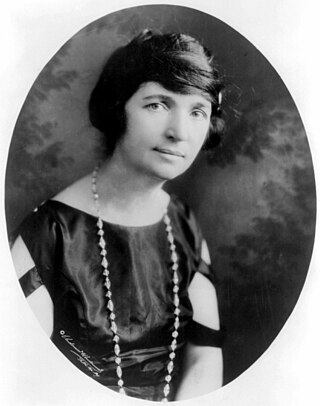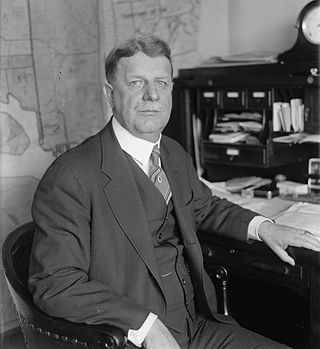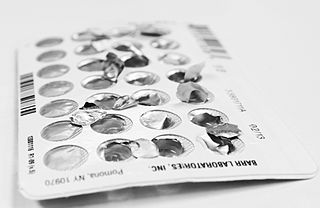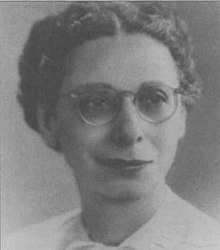
Margaret Higgins Sanger, also known as Margaret Sanger Slee, was an American birth control activist, sex educator, writer, and nurse. Sanger popularized the term "birth control", opened the first birth control clinic in the United States, and established organizations that evolved into the Planned Parenthood Federation of America.
Griswold v. Connecticut, 381 U.S. 479 (1965), was a landmark decision of the U.S. Supreme Court in which the Court ruled that the Constitution of the United States protects the liberty of married couples to buy and use contraceptives without government restriction. The case involved a Connecticut "Comstock law" that prohibited any person from using "any drug, medicinal article or instrument for the purpose of preventing conception". The court held that the statute was unconstitutional, and that its effect was "to deny disadvantaged citizens ... access to medical assistance and up-to-date information in respect to proper methods of birth control." By a vote of 7–2, the Supreme Court invalidated the law on the grounds that it violated the "right to marital privacy", establishing the basis for the right to privacy with respect to intimate practices. This and other cases view the right to privacy as "protected from governmental intrusion".

Louise Dresser was an American actress. She is perhaps best known for her roles in the many films in which she played the wife of Will Rogers, including State Fair and David Harum.

Howard County General Hospital is a 225-bed, not-for-profit health care provider located in Columbia, Maryland.

Bill Baird is a reproductive rights pioneer, called by some media the "father" of the birth control and abortion-rights movement. He was jailed eight times in five states in the 1960s for lecturing on abortion and birth control. Baird is believed to be the first and only non-lawyer in American history with three Supreme Court victories.

John Charles Linthicum was a U.S. Congressman from the 4th Congressional district of Maryland, serving from 1911 to 1932.

Birth control, also known as contraception, anticonception, and fertility control, is the use of methods or devices to prevent unintended pregnancy. Birth control has been used since ancient times, but effective and safe methods of birth control only became available in the 20th century. Planning, making available, and using human birth control is called family planning. Some cultures limit or discourage access to birth control because they consider it to be morally, religiously, or politically undesirable.

Ariana Brannigan Kelly is an American politician from Maryland and a member of the Democratic Party. She is a member of the Maryland Senate from District 16, and was previously a member of the Maryland House of Delegates representing District 16 from 2011 to 2023, which is located in Montgomery County.

The birth control movement in the United States was a social reform campaign beginning in 1914 that aimed to increase the availability of contraception in the U.S. through education and legalization. The movement began in 1914 when a group of political radicals in New York City, led by Emma Goldman, Mary Dennett, and Margaret Sanger, became concerned about the hardships that childbirth and self-induced abortions brought to low-income women. Since contraception was considered to be obscene at the time, the activists targeted the Comstock laws, which prohibited distribution of any "obscene, lewd, and/or lascivious" materials through the mail. Hoping to provoke a favorable legal decision, Sanger deliberately broke the law by distributing The Woman Rebel, a newsletter containing a discussion of contraception. In 1916, Sanger opened the first birth control clinic in the United States, but the clinic was immediately shut down by police, and Sanger was sentenced to 30 days in jail.
The history of birth control, also known as contraception and fertility control, refers to the methods or devices that have been historically used to prevent pregnancy. Planning and provision of birth control is called family planning. In some times and cultures, abortion had none of the stigma which it has today, making birth control less important.
The Mountain Maternal Health League (MMHL) was established in 1936 to provide contraception to women living in rural Appalachian Kentucky.

Louise Stevens Bryant (1885–1956) was an American public health specialist, writer, editor and publicist. She was especially involved in the fields of human sexuality and maternal health, and was the executive secretary of Robert Latou Dickinson's Committee on Maternal Health from 1927 to 1935.
Adolescent sexuality has been a topic observed and studied within the United Kingdom throughout the 20th century and in the 21st century. Associated organisations have been established to study and monitor trends and statistics as well as provide support and guidance to adolescents.

Nellie Louise Young was the first African American woman licensed to practice medicine in Maryland.

The Woman Patriot Corporation (WPC) was an American Progressive Era organization formed by women who had been previously active in the National Association Opposed to Women's Suffrage. The group identified as anticommunist, anti-pacifist, and anti-feminist. The WPC was formed in response to the then recent enfranchisement of women via the Nineteenth Amendment on August 26, 1920.
Florence Eilau Bamberger was an American pedagogue, school supervisor, progressive education advocate, and author. Influenced by the ideas of John Dewey, she researched, lectured, and wrote extensively on the concept of child-centered education. She spent most of her career as a professor of education in the department of philosophy at Johns Hopkins University, and was the first woman to attain a full professorship at that university. From 1937 to 1947 she served as director of Johns Hopkins' College for Teachers. After her retirement, she taught in private elementary schools in Baltimore, Maryland.
Cora Louise Hartshorn was an American pioneer in the field of birth control. She used her position in the community of Short Hills, New Jersey to form the Short Hills Birth Control Committee and to raise funds for a clinic during 1926–1927. This helped to fund the statewide New Jersey Birth Control League, which opened the Newark Maternal Health Center, New Jersey's first birth control clinic, in 1928. The New Jersey Birth Control League was later renamed the New Jersey League for Planned Parenthood, now Planned Parenthood of Metropolitan New Jersey.
Laurie Schwab Zabin was an American public health researcher and professor who studied adolescent reproductive health, family planning, sexual behaviors, and abortion trends. Her research and advocacy work made her a leading figure in this field.











